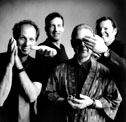
Comment
on this story
What:
King Crimson
When:
Tuesday, July 24, 8 PM
Where:
Tennessee Theatre
Cost:
Call Tickets Unlimited at 656-4444
|
|

King Crimson's Adrian Belew is at the top of his craft
by Mike Gibson
It might have seemed, at the outset, an odd and singularly misbegotten musical partnership, when King Crimson's Svengali, guitarist and guiding force Robert Fripp enlisted singer/guitar slinger Adrian Belew in 1981 in reforming the 12-year-old art rock unit after a six-year hiatus.
The Eastern sage of '70s prog-rock, the enigmatic Fripp is renowned for his disciplined, profoundly centered approach to music. He speaks in aphorisms ("King Crimson is a way of doing things. When there's nothing to be done, nothing is done."), and mentors a host of like-minded disciples in a self-styled "school" of guitar philosophy he dubs "The League of Crafty Guitarists."
Belew, a highly accomplished player in his own right, is one of rock guitar's most idiosyncratic free spirits, a former Frank Zappa sideman who distinguished himself through unhinged whammy-bar frenzies, via uncanny six-string reproductions of bird calls and pachyderms.
But the collaboration worked, and now stands alone as the most enduring partnership in Crimson's 32 years of music-making, a decade-traversing history that surely encompasses more musicians and more stylistic about-faces than that of any other band in modern music memory.
"I don't think that's unfair; I would say that certainly epitomizes the differences between [him and Fripp] as players and people," says Belew, rendering his own judgment on the notion that he and his fellow Crimson guitarist are in some respects polar opposites as players. Having recently embarked on a tour in support of King Crimson's latest album, a mostly live three-disc outing entitled The ConstruKction of Light, Belew graciously speaks to a local reporter from the dubious comfort of yet another hotel room in Anytown, USA.
"Robert does have a very disciplined sort of regimen he does daily, and I don't. I kind of approach things from a more instinctual aspect, try to dig around and find interesting things. I think those two (styles) fit together really quite well because they make up a rounded picture...it's good to have those kinds of differences. It's been a very unusual collaboration, I will admit. I don't know why it works or how it works, but it does work. There's a chemistry there and it's an unusual one. What keeps me coming back to it is that between the two of us, we manage to challenge each other."
And the two string-and-fret maestros have, over the course of some 20 years, established all-important easements, philosophical commonalties that distinguish King Crimson music through evolutions that span bombastic '70s art-rock, jazz fusion, no-wave electronic minimalism and even riff-centric hard rock.
"The commonalties between all the different musics that are called King Crimson, apart from the fact that they've all involved Robert Fripp, are musical choices," says Belew. "There are things you do and things you don't do that make up the music of King Crimson, choices you make and choices you don't make."
"It's mostly things you don't do," he says with a chuckle shaded with self-effacement. "It's as if you have a pack of 24 crayons, and you pick out six of them. You decided that these are the crayons you get to use. For example, rhythmically we rarely play in standard time signatures. We mostly play in odd time signatures, time signatures that are polyrhythms, where one person is in one time and another is playing in a different one. It's those choices the band continues to make for itself—there are many more of them—and you hear it and you say 'Oh, that's got to be King Crimson.'"
Though the latest Crimson epistle is a live effort, Belew says the band has already begun forging its next musical incarnation, a guitar-based, riff-centric approach that the ever-quotable Fripp has labeled "Nouveau Metal." The band's latest tour will feature five or six "new pieces...they may not be songs yet," and an album should be forthcoming sometime this fall.
"I make it a habit never to try to explain what Robert means," says Belew of the new-metal tag, in a gentle jibe at his sagacious bandmate—one yet marked with a palpable affection.
"But what it is to me, it's a little more within the field of metal. I don't know if you want to call it heavy metal or whatever, but it's a little more in that area. Those musics tend to be structured on very strong guitar riffs, played in this case by more than one person, and a heavier and busier kind of drumming. Vocally, I don't know what it means because I'm still working it out. I've got to find a new approach to singing metal music with King Crimson because I don't like the approach that most people have used in the past."
As for his own playing, Belew says that—at least for the moment—some of his erudite bandmate's more structured leanings may have influenced his strivings on the instrument.
"I've grown a reputation around making weird and interesting sounds, seagulls and elephants and different things, but in the last year I've gone back to the basics of just playing the guitar, without all the bells and whistles," says Belew. Then he adds, with playful relish, "My plan is that as I tire of doing that, I'm all the while rebuilding to the next layer of bells and whistles."

July 19, 2001 * Vol. 11, No. 29
© 2001 Metro Pulse
|





